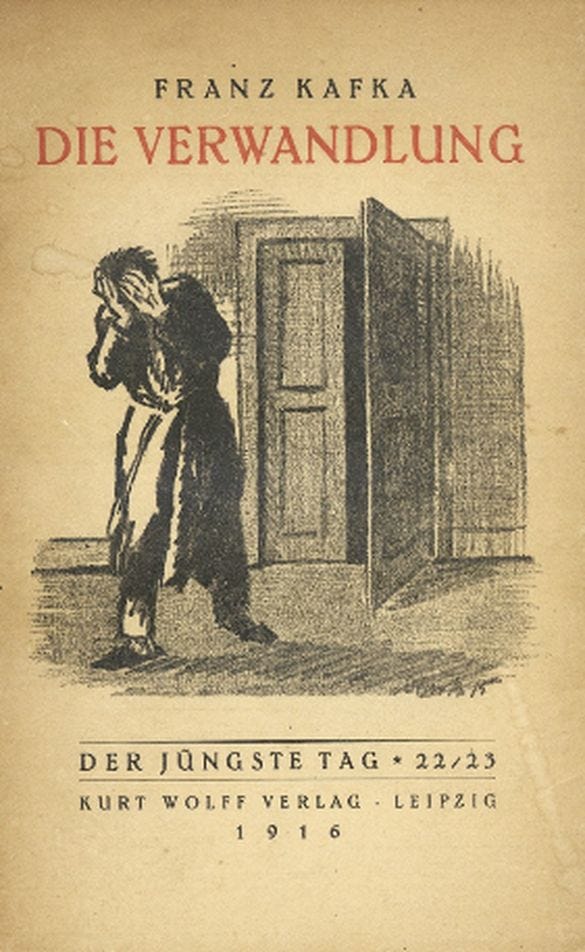
The Transformation (The Metamorphosis)
"Selected Stories" by Franz Kafka. Translated & Edited by Mark Harman (Harvard, 2024)
I’m reading a collection of short stories by Franz Kafka, with a new translation and endnotes by Mark Harman. I come upon the giant insect of a story by Kafka, The Transformation, often known and translated as The Metamorphosis. I first read this short story in an early translation when I was 15. For me, Kafka was the James Dean of literature, a rebel against forces he had no control over, yet he noted the absurdity of it all. By the time I was Twenty, I had stopped reading Kafka and put it aside as literature for a teenager. I never gave up on my Kafka books and still have the same editions I carried from home to temporary beds for decades. I’m a sucker or customer for any new translation of a classic from my youth, and therefore I purchased Harman’s new translations of Kafka’s short stories. I was going to start by writing about the translations, but after finishing this story this afternoon, I cried a bit.
The narrative is about a man, Gregor Samsa, who wakes up one morning and finds himself as a monster or a representation of a giant insect. Gregor lives with his parents and younger sister and is one of the breadwinners of his family. He’s a traveling salesman, selling god knows what, something to do with cloth or fabrics, and is very much a company man until this mysterious tragedy occurs. How does one who becomes somewhat of an actual insect communicate with the others in his social world? It is even harder for Gregor to turn around due to his many little legs. He can only go one direction in a manner, but changing directions is difficult for the little monstrous vermin. What happens is that his parents and sister are shocked and horrified by the creature itself, and they often wonder if that ugly thing is Gregor.
What brought tears to my eyes are the thoughts or memories of being a caretaker for someone ill in the family, or the alienation one feels when there is a sick person in the house. One imagines how the patient feels and the social or family grouping around that person. Sickness is taboo, and no one knows how to operate around an illness or how to deal with the issues involved in such a horrific world. The worst fear as a human is watching/reading the family deal with Gregor’s problem and their behavior. Their presence is not one of support but the ugly side of behavior dealing with someone who is struck down by disease or the inability to help themselves. It is pretty hopeless in that Kafka sense when you depend on others who can’t or won’t help you.
The other thing that impressed me was the importance of having a bedroom while living with your family. I’m sure I picked up on this as a teenager while reading this novella. The only haven for Gregor is his bedroom, which is messy, dusty, dirty, and insect-like heaven for a teenager. As a grown (very) up, I now see his room as a prison. His jailers are his parents and sister. They bring food, leave it on his floor, and then leave the premises. Although he can’t humanly express himself to others, his moments of profound sadness are witnessing his parents through the crack of the bedroom door, eating, sleeping, and not much joy. In a sense, they, too, are prisoners in their apartment.
In his lifetime, Kafka refused to have any illustrators do an actual portrait of Gregor as the insect. It didn’t stop Vladimir Nabokov, who knows an insect or two, from sketching Kafka’s bug, which, being true to Kafka’s vision as I’ve read, I'm refusing to look online or in a publication of Nabokov’s drawing. The Insect in The Transformation doesn’t need anything else because of Kafka’s sketchy-like approach, such as Thelonious Monk sketching out a melody with his piano; our hero does the same by giving space for the reader to picture the insect in their head. Like the apple thrown by the father and attached to Gregor’s vermin body, what sticks to me is the frustration between the family unit and Gregor. In this case, the son is ignored or thrown under the bus with a rotting apple and forced to stay in his bedroom. It is a vision of a family falling apart, but even worse, the family unit survives the loss of Gregor as a positive thing. Life does go on, and if we choose to pull the plug on a loved one, or even worse, not acknowledge its suffering, then we are guilty. It is similar to a crisis, and we ignore it or explain it away as unimportant, whereas in truth, we do know it is significant. How we carry ourselves is very much in the narrative, and the Family's role is cruelly damaged in Kafka’s The Transformation (The Metamorphosis). The only hope is moving beyond death, and Gregor witnesses his unimportance to the family or anyone else. Therefore, Gregor’s death would free his family and a solution to his issue—a painful reflection of one’s existence.















Delightful....Franz seemed to live in a future which we currently occupy as the present.
Thanks Tosh. Your description of the insect as a Thelonious Monk melody is exactly right. That’s worth the whole essay.